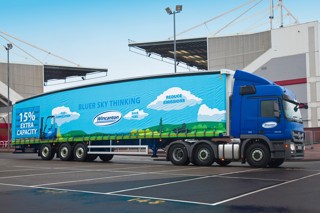Longer lorries could hit UK roads from as early as next year after the Government gave the green light to the introduction of longer-semi trailers (LSTs).
It follows a nine-year trial of the vehicles, which can be up to 15.65m in length, found them to be safer, more economical and better for the environment.
The Department for Transport (DfT), which published its response to its consultation on the introduction of LSTs today (Tuesday, August 24), says that the majority of respondents were in favour of their use.
It is estimated LSTs could remove up to 1 in 8 freight journeys by carrying the same amount of cargo in fewer lorries.
This, says the DfT, would support the Government’s Transport Decarbonisation Plan by reducing mileage, congestion and carbon emissions.
Transport secretary Grant Shapps said: “Today's announcement is a vital step forwards as we work to introduce more environmentally friendly freight to our roads and build back greener.”
More than half (57%) of those surveyed in the Government consultation felt LSTs should be in general circulation and could see the positive effects the move would have on both the road haulage industry and climate change.
The nine-year trial saw a reduction in the number of lorries making journeys across the country, with an average 8% reduction in miles covered by freight, as well as a 6.2% reduction in pollutants expelled. It also found the use of LSTs reduced the number of road traffic collisions, resulting from fewer journeys being made.
Road safety continues to be of paramount concern, and while the trial showed the use of LSTs caused fewer collisions, additional mitigations are under review to ensure hauliers and road users are kept even safer still.
The DfT says it will now consider the use of LSTs on Britain’s roads outside trial conditions, and it says that the vehicles could be rolled out sometime in 2022.
DfT trial on 48-tonne lorries
The Government will also soon launch a separate trial using heavier-than-normal, 48-tonne lorries, following a positive response from the consultation on their introduction.
These lorries will be able to transport heavier containers directly to and from rail depots so that goods can be transported across the country by train, says the DfT.
Currently, the maximum weight of a lorry (44 tonnes) makes it difficult to carry heavier goods to rail depots, meaning goods are dispersed between more lorries to be taken to their end destination by road.
The DfT says that the trial would ensure these heavier lorries are only used on specific routes and would limit their use to a maximum journey length.
























Login to comment
Comments
No comments have been made yet.